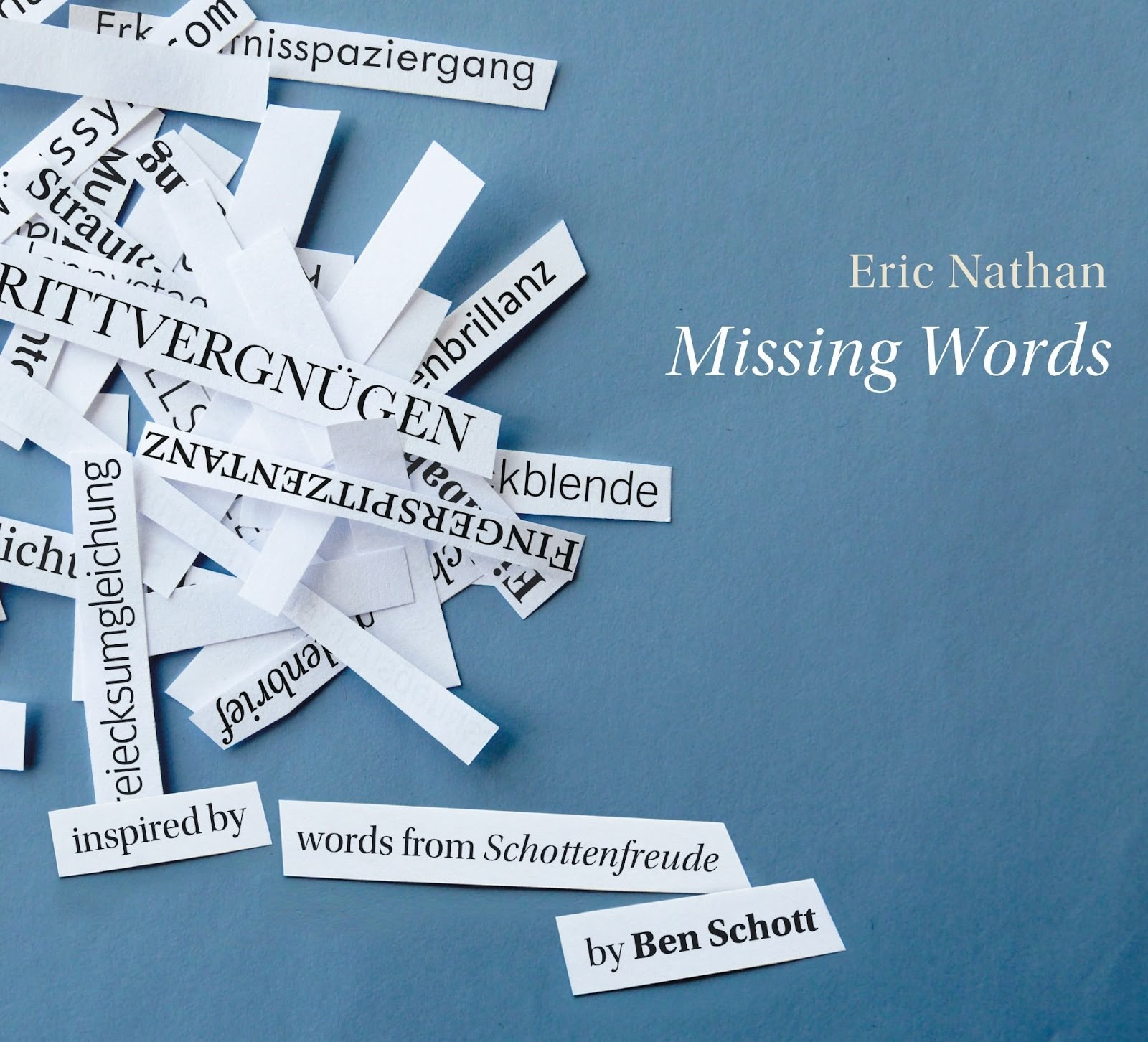From New Focus Recordings
Eric Nathan’s ‘Missing Words’ Speaks When Language Fails Us
On January 21st, 2022, New York-born composer Eric Nathan released an album anthology of his six works titled Missing Words. Each composition consists of multiple movements, all with titles derived from newly devised German portmanteaux, which can be found in Ben Schott’s 2013 inventive dictionary Schottenfreude. With no single movement spanning over seven minutes in length, each episode feels like a vignette, a glimpse into a moment in time felt profoundly by the composer, then dictated into musical form.
Glossing over the societal context predating the album’s release seems foolish to this author, as I believe these pieces work best within the communicative styles born from and fostered by the pandemic. In a world where effective and concise verbal communication is more important than ever due to the isolated nature of interpersonal relationships—whether between two socially distanced best friends or the legion of professionals separated by the screens in their individual home offices—cultural phenomena has revolved around filling the gaps left by language and its limitations. Linguistic analysis pervades social media, however casually or formally. These analyses range from reactions to and repercussions of the divisive political rhetoric that dominates US media, to a deconstruction of Generation Z colloquialisms like “no because” by TikTok user @abrahampiper, to the poignant podcast episode of Krista Tippett’s On Being with poet Ocean Vuong where he breaks down the frequency of violent words in slang among English-speakers.
After seeing such a widespread focus on linguistics and the question of how language affects social interaction, Dr. Nathan’s work feels particularly timely, pulling from source material that seeks to address missing words in the English language as he fills gaps in verbal communication transcending beyond all language, through the emotive medium of music. To say Nathan’s work encapsulates that disparity is an understatement. As Ben Schott remarks in his lovely foreword to the album:
“Schottenfreude exists because when English is exhausted, we turn to German.
“Missing Words exists because when words are exhausted, we turn to music.”
One element captured in this complete body of work is the idea of the literal versus the figurative. The album booklet actually includes two separate track listings—one with the portmanteau movement names and the subsequent literal translation of the compound word breakdown (i.e. Herbtslaubtrittverginügen translates directly to Autumn-Foliage-Strike-Fun), the other giving a definition in addition to the breakdown (respectively, the definition for the prior example being “Kicking through piles of autumn leaves”). While listening to the album, I sought to interpret each track three separate ways:
- Through identifying the individual elements given in the deconstructed compound word translation,
- By listening through the lens of the comprehensive definition given for the movement,
- And combining the two concepts into one cohesive musical form, using the literal elements as thematic material informed by the figurative translation of the word given in the definition.
By doing this, I found an auditory experience that I related to on multiple levels, intellectually and emotionally, while giving myself time to sit with how those words in different contexts evolved within the musical space. I’d advise any listener to follow the same process; I found catharsis in some of my own personal baggage provided by these past few years, particularly with Missing Words VI.
Featuring incredible performances from these ensembles—the Boston Modern Orchestra Project, the American Brass Quintet, Parry and Christopher Karp, the International Contemporary Ensemble, the Neave Trio, and Hub New Music—each Missing Words compilation follows a different instrumentation, which gives the entire album a distinct sense of variety between the meanings of the individual pieces. While the album’s thirteen-page booklet contains the aforementioned foreword and a brilliant in-depth musical summary analysis provided by composer and Boston Symphony annotator Robert Kirzinger, here are descriptions of some of my favorite moments of the album based on the definitions denoted in the booklet:
Missing Words I, Mvt. III “Fingerspitzentanz” (Fingertips-Dance)—meaning “Tiny triumphs of nimble-fingered dexterity.”
Call and response motifs between individual players highlight technical flexibility in idiomatic challenges for each instrument, yielding a quietly victorious end to the first work in the series. As a bassoonist myself, I was drawn toward the prowess of the woodwind performers: Amy Advocat on clarinet and Ronald Haroutunian on bassoon.
Missing Words III, Mvt. III “Straußmanöver” (Ostrich-Maneuver)—meaning “The short-term defense strategy of simply denying reality.”
The final moments of this movement with the cello in its highest tessitura gave me complete pause. Parry Karp’s mastery of the instrument’s range steals the show, and the vulnerability he supplies in contrast to the stubborn piano chords interjected by Christopher Karp lead perfectly into the contrasting frenzied and charged nature of the following concluding movement.
Missing Words VI, Mvt. V “Witzbeharrsamkeit” (Joke-Insistence) III—meaning “Unashamedly repeating a bon mot until it is properly heard by everyone present.”
A prevalent theme throughout the entirety of these pieces is the infusion of multiple genres, including motifs provided in the nineteenth century by Ludwig van Beethoven. With the focus of this piece being placed solely on human interaction, this third iteration of “Witzbeharrsamkeit” draws attention to the emotional isolation of an individual. One can hear Alyssa Wang’s violin instigating the overdrawn-out joke, while the rest of the performers conspire to avoid joining by playing together in a juxtaposing compositional technique. Traditional vs. Contemporary. Retired vs. Relevant. With the context that this specific piece was written during the lockdown of 2020, the alienation of the violin in turn becomes a place of solace for the listener.
As this is a review of the full album, the masterful production and editing also need to be addressed. No moment felt out of balance, and every audio engineer involved was able to capture the stark contrasts in timbre in dynamic, allowing for an engaging, visceral audience experience. In addition, Denise Burt’s minimalist and tranquil album design puts the focus right where it needs to be—on the words, and even more importantly, on what lies between them.
In conclusion, this standout body of work from Eric Nathan is a perfect addition to the pandemic-influenced artistic canon. Even outside of that narrative, the album still succeeds, providing an easy-to-follow linear progression through each Missing Words vignette, woven together by an omnipresent thread—the question of how to bridge the gap of language with abstraction through art. On that note, I will leave you with one final quote by Hans Christian Andersen that this work embodied in my mind since my preliminary read of Ben Schott’s foreword:
“Where words fail, music speaks.”
With that in mind, Dr. Eric Nathan’s work speaks from a place where even Ben Schott’s profundity with words cannot truly go.



